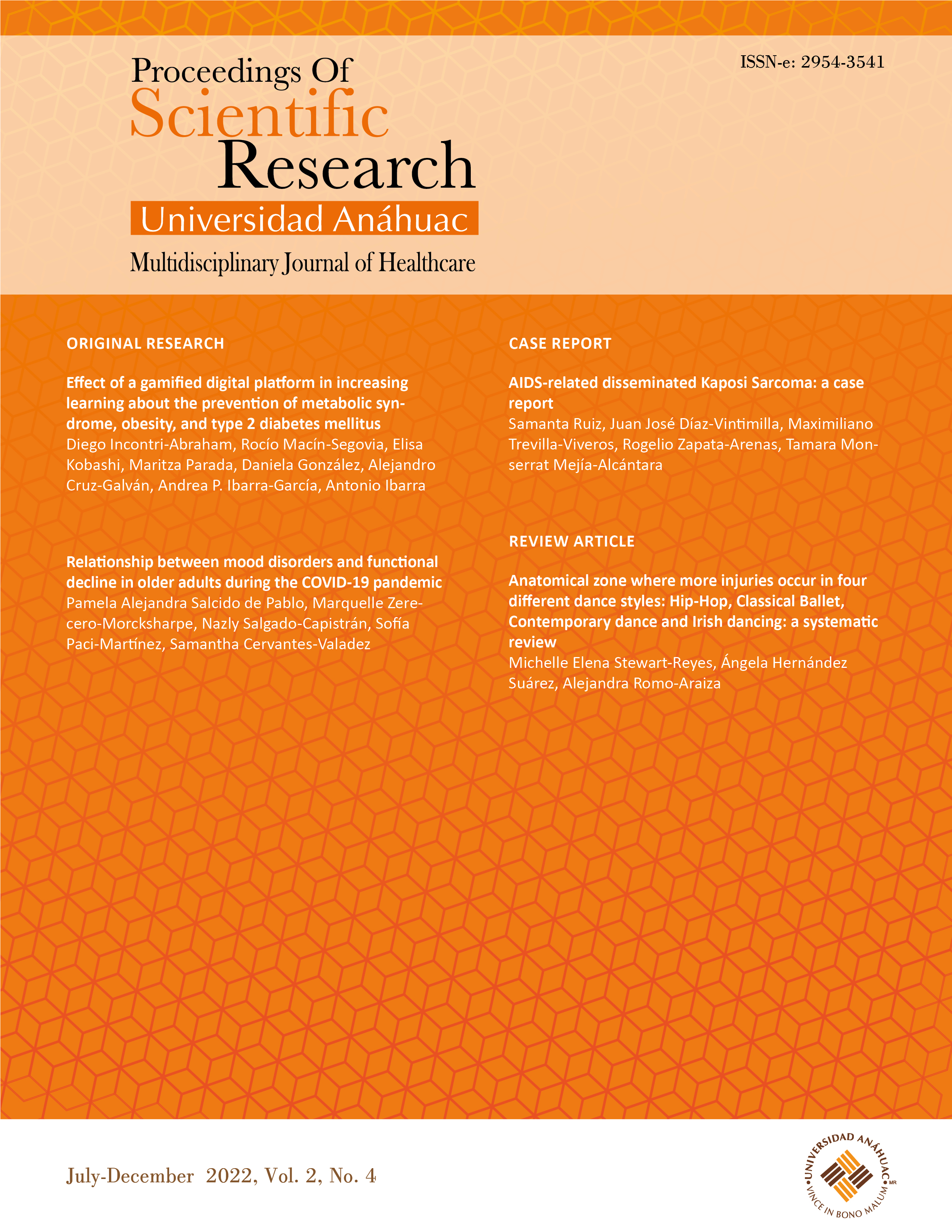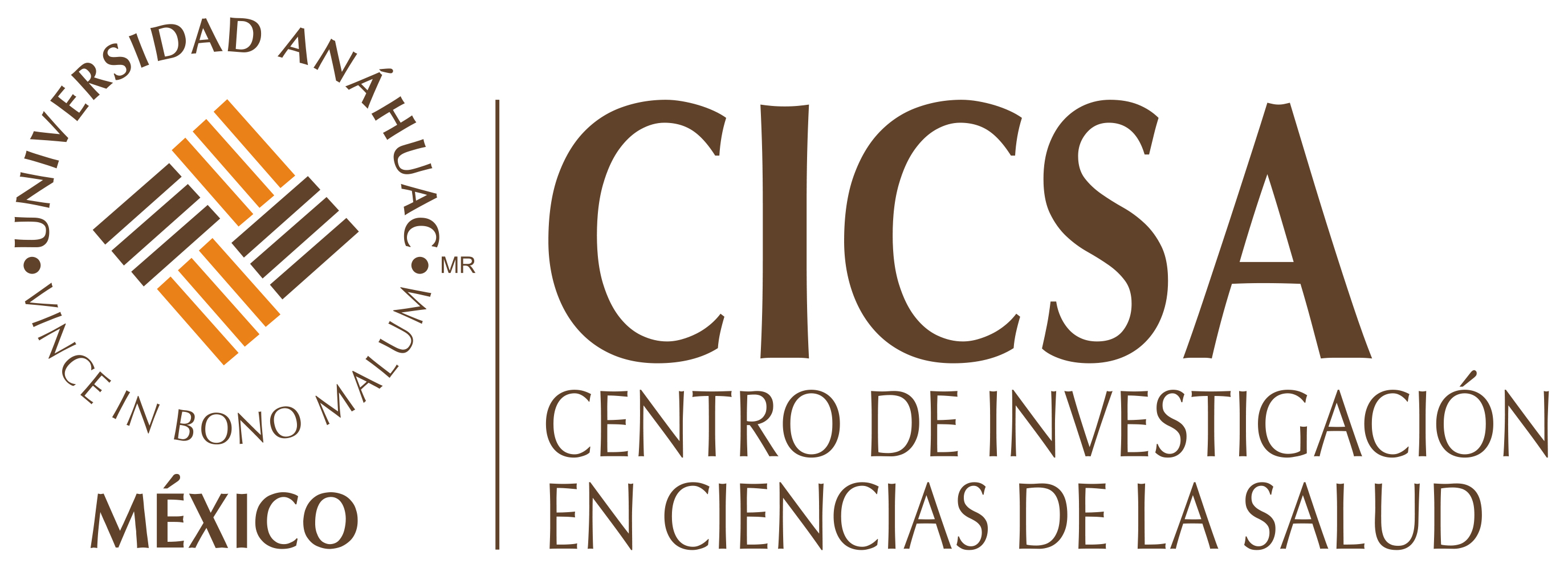Effect of a gamified digital platform in increasing learning about the prevention of metabolic syndrome, obesity, and type 2 diabetes mellitus
DOI:
https://doi.org/10.36105/psrua.2022v2n4.01Abstract
Introduction: Gamified digital platforms allow non-health related individuals to learn about the prevention, management and treatment of obesity, metabolic syndrome, and type 2 diabetes mellitus (T2DM). Objective: The purpose of this study was to evaluate whether a new gamified digital platform increases learning about the prevention of metabolic syndrome, obesity, and T2DM. Methods: An exploratory, randomized, cause-effect study was carried out in 150 children between 10 and 12 years of age. Three exploratory, cause-effect experiments were designed to evaluate each one of the following pathologies: T2DM, obesity and metabolic syndrome. For each experiment, two study groups of 25 individuals each were formed. The experimental group was asked to use the digital platform that contained the information on the pathology under study in an animated storytelling and playful way. The control group received written information about each pathology. The assessment was carried out by applying a validated questionnaire including basic questions about the three diseases. This test was performed before and after the intervention. Results: We found a significant improvement (p<0.05) in the post-intervention knowledge acquired within the experimental group about metabolic syndrome, obesity, and T2DM when using the digital platform and compared to the control group. Children in the control group significantly improved their scores after the intervention compared to their baseline ones. Conclusion: Gamified digital platforms have the potential to be a novel primary prevention method for metabolic diseases. The present study allows us to conclude that any validated learning instrument increases knowledge about metabolic diseases. However, gamified digital platforms significantly increase learning compared to other types of methods (written information).
Downloads
PLUMX metrics
References
Jiang J, Ahn J, Huang WY, Hayes RB. Association of obesity with cardiovascular disease mortality in the PLCO trial. Prev Med. 2013;57(1):60-4. https://doi.org/10.1016/j.ypmed.2013.04.014
Berrington de Gonzalez A, Hartge P, Cerhan JR, Flint AJ, Hannan L, MacInnis RJ, et al. Body-mass index and mortality among 1.46 million white adults. N Engl J Med. 2010;363(23):2211-9. https://www.nejm.org/doi/full/10.1056/NEJMoa1000367
Czernichow S, Kengne AP, Huxley RR, Batty GD, de Galan B, Grobbee D, et al. Comparison of waist-to-hip ratio and other obesity indices as predictors of cardiovascular disease risk in people with type-2 diabetes: a prospective cohort study from ADVANCE. Eur J Cardiovasc Prev Rehabil. 2011;18(2):312-9. https://doi.org/10.1097/HJR.0b013e32833c1aa3
Kaur J. A comprehensive review on metabolic syndrome. Cardiol Res Pract. 2014;2014:943162. https://doi.org/10.1155/2014/943162
Singh M, Arora R, Kodumuri V, Khosla S, Jawad E. Coronary revascularization in diabetic patients: Current state of evidence. Exp Clin Cardiol. 2011;16(1):16-22. https://www.ncbi.nlm.nih.gov/pmc/articles/PMC3076161/
National Cholesterol Education Program Expert Panel on Detection E, Treatment of High Blood Cholesterol in A. Third Report of the National Cholesterol Education Program (NCEP) Expert Panel on Detection, Evaluation, and Treatment of High Blood Cholesterol in Adults (Adult Treatment Panel III) final report. Circulation. 2002;106(25):3143-421. https://pubmed.ncbi.nlm.nih.gov/12485966/
Romero-Martinez M, Shamah-Levy T, Vielma-Orozco E, Heredia-Hernandez O, Mojica-Cuevas J, Cuevas-Nasu L, et al. [National Health and Nutrition Survey 2018-19: methodology and perspectives]. Salud Publica Mex. 2019;61(6):917-23. https://doi.org/10.21149/11095
Palmer MK, Toth PP. Trends in Lipids, Obesity, Metabolic Syndrome, and Diabetes Mellitus in the United States: An NHANES Analysis (2003-2004 to 2013-2014). Obesity (Silver Spring). 2019;27(2):309-14. https://doi.org/10.1002/oby.22370
Barquera S, Hernandez-Barrera L, Trejo-Valdivia B, Shamah T, Campos-Nonato I, Rivera-Dommarco J. [Obesity in Mexico, prevalence andtrends in adults. Ensanut 2018-19.]. Salud Publica Mex. 2020;62(6):682-92. https://doi.org/10.21149/11630
Aggoun Y. Obesity, metabolic syndrome, and cardiovascular disease. Pediatr Res. 2007;61(6):653-9. https://doi.org/10.1203/pdr.0b013e31805d8a8c
Rughani A, Friedman JE, Tryggestad JB. Type 2 Diabetes in Youth: the Role of Early Life Exposures. Curr Diab Rep. 2020;20(9):45. https://doi.org/10.1007/s11892-020-01328-6
Narayan KM, Boyle JP, Thompson TJ, Sorensen SW, Williamson DF. Lifetime risk for diabetes mellitus in the United States. JAMA. 2003;290(14):1884-90. https://doi.org/10.1001/jama.290.14.1884
Temneanu OR, Trandafir LM, Purcarea MR. Type 2 diabetes mellitus in children and adolescents: a relatively new clinical problem within pediatric practice. J Med Life. 2016;9(3):235-9. https://pubmed.ncbi.nlm.nih.gov/27974926/
Mahmood SS, Levy D, Vasan RS, Wang TJ. The Framingham Heart Study and the epidemiology of cardiovascular disease: a historical perspective. Lancet. 2014;383(9921):999-1008. https://doi.org/10.1016/S0140-6736(13)61752-3
Klaassen R, Bul KCM, Op den Akker R, van der Burg GJ, Kato PM, Di Bitonto P. Design and Evaluation of a Pervasive Coaching and Gamification Platform for Young Diabetes Patients. Sensors (Basel). 2018;18(2). https://doi.org/10.3390/s18020402
Cha E, Kim KH, Umpierrez G, Dawkins CR, Bello MK, Lerner HM, et al. A feasibility study to develop a diabetes prevention program for young adults with prediabetes by using digital platforms and a handheld device. Diabetes Educ. 2014;40(5):626-37. https://journals.sagepub.com/doi/10.1177/0145721714539736
Cha E, Umpierrez G, Kim KH, Bello MK, Dunbar SB. Characteristics of American young adults with increased risk for type 2 diabetes: a pilot study. Diabetes Educ. 2013;39(4):454-63. https://doi.org/10.1177/0145721713486199
Morrell JS, Lofgren IE, Burke JD, Reilly RA. Metabolic syndrome, obesity, and related risk factors among college men and women. J Am Coll Health. 2012;60(1):82-9. https://doi.org/10.1080/07448481.2011.582208
Kumar S, Kelly AS. Review of Childhood Obesity: From Epidemiology, Etiology, and Comorbidities to Clinical Assessment and Treatment. Mayo Clin Proc. 2017;92(2):251-65. https://doi.org/10.1016/j.mayocp.2016.09.017
Knowler WC, Barrett-Connor E, Fowler SE, Hamman RF, Lachin JM, Walker EA, et al. Reduction in the incidence of type 2 diabetes with lifestyle intervention or metformin. N Engl J Med. 2002;346(6):393-403. https://www.nejm.org/doi/full/10.1056/NEJMoa012512
Hebden L, Cook A, van der Ploeg HP, King L, Bauman A, Allman-Farinelli M. A mobile health intervention for weight management among young adults: a pilot randomised controlled trial. J Hum Nutr Diet. 2014;27(4):322-32. https://doi.org/10.1111/jhn.12155
Published
How to Cite
Issue
Section
License
Copyright (c) 2022 Diego Incontri-Abraham, Rocio Macin-Segovia, Elisa Kobashi, Maritza Parada, Daniela González, Alejandro Galván , Andrea P. Ibarra-García , Antonio Ibarra

This work is licensed under a Creative Commons Attribution-NonCommercial-NoDerivatives 4.0 International License.
All the intellectual content found in this publication is licensed to the consumer public under the figure of Creative Commons©, unless the author of said content has agreed otherwise or limited said faculty to "Proceedings of Scientific Research Universidad Anáhuac. Multidisciplinary Journal of Healthcare©" or "Universidad Anáhuac Mexico©" in writing and expressly.
Proceedings of Scientific Research Universidad Anáhuac. Multidisciplinary Journal of Healthcare is distributed under a Creative Commons Attribution-NonCommercial-NoDerivatives 4.0 International License.
The author retains the economic rights without restrictions and guarantees the journal the right to be the first publication of the work. The author is free to publish his article in any other medium, such as an institutional repository.













